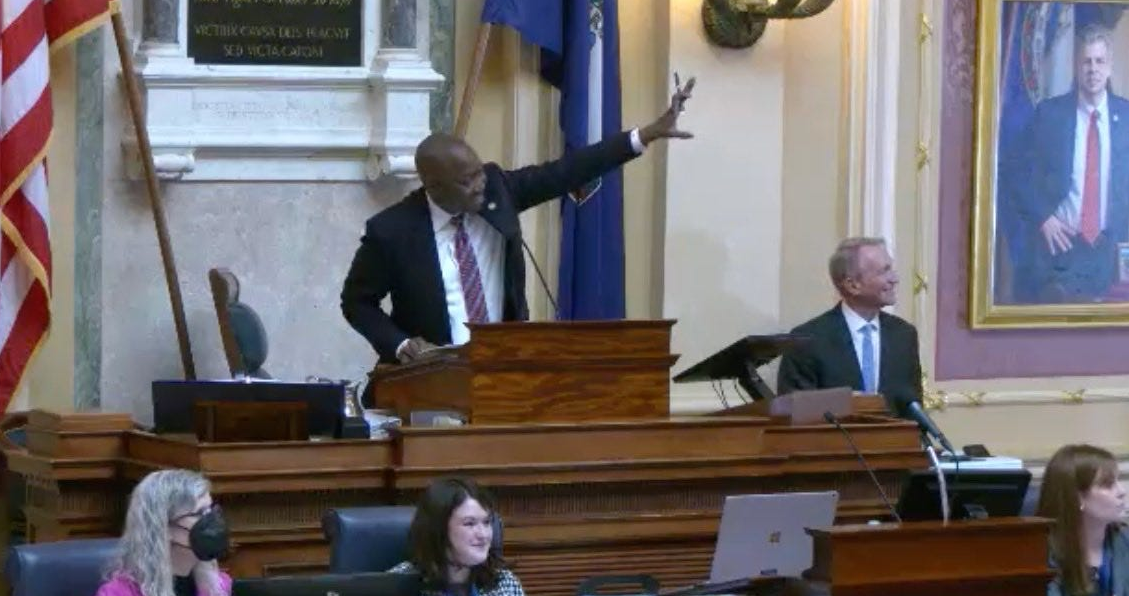
“It is only when the people become ignorant and corrupt, when they degenerate into a populace, that they are incapable of exercising their sovereignty. Usurpation is then an easy attainment, and an usurper soon found. The people themselves become the willing instruments of their own debasement and ruin.”
— President James Monroe, First Inaugural Address (4 March 1817)
I couldn’t help but read with interest Marty Davis’ reflections on the Aaron Sorkin adaptation of To Kill a Mockingbird at the Kennedy Center. Sorkin is perhaps best known by politicos for his idealized imaginings of how Washington ought to work in the television series The West Wing; perhaps better known for the film A Few Good Men.
If you look hard enough in Washington D.C. one can still find bits and pieces of Sorkin’s dream of a better America — this 1940s era distillation where Franklin Delano Roosevelt is a secular demigod in a sea of uncertainty, where Norman Rockwell captures the best of the American spirit, and that all-too-slippery word hope in the sense that Ronald Reagan and Bill Clinton with varying degrees of success attempted to capture and dragoon into political service still prevails in the halls of American democracy.
Of course, Sorkin’s idealized version of American government soon yielded to more hard-nosed envisioning of how power really worked. One can’t mention how many times you have to try to explain to young college graduates that Washington is not House of Cards brutality but rather a banal repetition of stupidity better captured by the dark comedy Veep.
Besides — the British version of House of Cards? Far superior.
Without a terrible degree of exaggeration, I don’t believe that it is too far-fetched to say that things have become worse — and not just politics in general, but the way we talk about politics generally.
Keeping the Leviathan at Bay
The Founding Fathers were terribly keen on this and suspicious that Americans themselves were not capable of self-government in the long term. Dennis Rasmussen’s Fears of a Setting Sun gathers the pessimism of the early Founders with their premonitions against foreign influence — particularly the British and French — stacked up against republican virtue.
Consider that all of the men we celebrate today as Founders exited public life under a cloud: Washington was burnt in effigy over the Jay Treaty, Hamilton exited under scandal after scandal, Adams openly jailed his political opposition, even Jefferson himself — whose reputation as party chief, author of the Declaration of Independence, and engineer of the Louisiana Purchase — was pilloried for his embargo of the European continent, a move which ravaged American shipping and helped set the stage for the ill-fated War of 1812.
Yet the one question that continued to plague the early Americans — and one that plagues us still today — is the question of faction or partisanship.
The early Jeffersonians attempted to soothe the public conscience by doing two things: (1) assuring every American that they were all Federalists and all Republicans, and (2) minimizing the reach of the federal government to such a degree that party faction would not override regional and state sentiments. Unfortunately for the Jeffersonians, this was no solution at all, as Fredericksburg’s tourism industry will readily attest.
Political Parties Accept Neither Rivals nor Dissidents (and That Is Dangerous)
Simone Weil — an ardent anti-fascist who died at 34 years of age through a combination of tuberculosis and refusing to eat more than her compatriots were allotted in the concentration camps of Nazi-occupied France — was a philosopher who impacted writers as diverse as Hannah Arendt, Michel Foucault, the Catholic writer Flannery O’Connor, and the American philosopher and social critic Cornell West. Weil’s observations about political factions are famously defined as follows:
- A political party is a machine to generate collective passions.
- A political party is an organisation designed to exert collective pressure upon the minds of all its individual members.
- The first objective and also the ultimate goal of any political party is its own growth, without limit.
Consider candidates for local and state office and how they are nearly forced to toe the line on matters of political orthodoxy — both on the left and the right. Consider any candidate who strays from the party line on a matter of import. How are we to treat such RINOs and DINOs?
Diversity of thought and opinion cannot be tolerated by political parties, ladies and gentlemen, because such diversity makes individuals far more difficult — to borrow Monroe’s terms — to usurp, debase, and ruin:
Because of these three characteristics, every party is totalitarian — potentially, and by aspiration. If one party is not actually totalitarian, it is simply because those parties that surround it are no less so….
Everywhere, without exception, all the things that are generally considered ends are in fact, by nature, by essence, and in a most obvious way, mere means. One could cite countless examples of this from every area of life: money, power, the state, national pride, economic production, universities, etc., etc.
Goodness alone is an end. Whatever belongs to the domain of facts pertains to the category of means. Collective thinking, however, cannot rise above the factual realm. It is an animal form of thinking. Its dim perception of goodness merely enables it to mistake this or that means for an absolute good. (emphasis added)
There’s something to learn from these concepts, not just in the sense of how we view ourselves but how we pursue the political. Not just the political in a wider and perhaps more Washingtonian sense, but in the local as well.
Magic Words Make Politics Moar Dumber
One hates to keep picking on poor Spotsylvania, but any nuance at all when talking about banned books produced the magic word “groomer” as if something from Harry Potter — also a banned book? — is going to happen. Where did they learn such an affinity for magic words? By being called “racists” and “bigots” and “haters” by a political left who also could not accept nuance in civil debate.
Notice that little flicker inside when you read that? That’s the animal form of thinking Weil warned us about — and it is inside each of us.
This strikes me as the very same impulse Mr. Davis picked up on in To Kill a Mockingbird:
“Mob’s a place where people go to take a break from their conscience,” Finch tells Scout. “A mob acts out of emotion, absent facts, absent contemplation, mostly absent responsibility. What they get in return is anonymity. Conscience can be exhausting.”
Winston Churchill once remarked to a critic of his writing that a writer does not owe impartiality between the fire and the fire brigade.
Yet this fire — the same fire touched upon by James Monroe, Simone Weil, Harper Lee and even Andy Sorkin — isn’t within the means which we confuse as ends, these abstractions we call education, economy, taxation, transportation, and so forth.
The ends are us. Not just the mob, but the individual other sitting on the opposite side of a cup of coffee.
Local politics can sometimes wrap themselves in the cloak of national politics. They can come wrapped in a flag and carrying a cross. They can even come cloaked as anti-fascism. Yet in my long experience, I have yet to see a Democratic or Republican way to build a road, public school, homeless shelter, or library.
Remember Why We Do Politics — For Us, Nor For Parties
James Monroe is a Fredericksburg Founding Father if there ever was one; Monroe walked our streets, breathed our air, and knew the bricks of this town in a way Washington never quite could — or did.
Yet Monroe’s war against ignorance and corruption in the moral sense was most certainly an effort to get Americans to see beyond the political factions and see one another as individuals; to avoid becoming that populace or mob so easily distracted by usurpers and demagogues.
Yes, it does take conscience. Yes, it does mean violating party orthodoxy in order to do the right thing. Or God forbid — working across the aisle in order to achieve something for the common good.
It is hard work, even uncomfortable at times, perhaps even small and unnoticed and rarely rewarded on social media, but vitally necessary for any republican form of government — especially local government where the stakes are more concrete and human, and where the political abstractions and distractions matter less.
Which brings us full circle, perhaps. Political parties at the local level? We didn’t used to have this in Virginia. Is it any small wonder why our local politics have coarsened by the decade with the introduction of political factions? Weil wouldn’t wonder much at all.
Maybe by re-capturing that local spirit where nuance and thought matter more than simplicity and magic words (what we used to call namecalling in middle school) we can fan the embers of that high-gloss romanticism Sorkin’s The West Wing tried to preserve when it comes to the nobility of politics rather than the nihilistic and totalitarian drama of House of Cards. What would Cicero advise?
The alternative isn’t kind — just cruel and coarse, and certainly an indictment upon those who participate in it directly or tolerate it passively.
For one, I remain confident that we can rescue the political from the totalitarian, especially if it means sacrificing national demagogues for the sake of rational thought among my neighbors.





